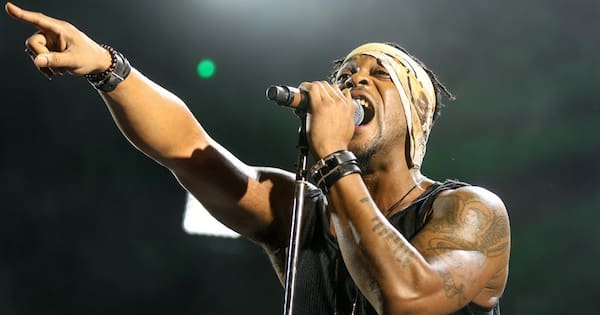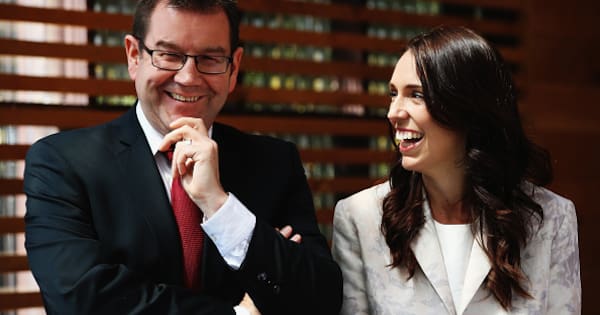Former Finance Minister Grant Robertson is standing by his economic spending decisions, and rejects the suggestion the last Labour government did not have enough real-world experience.
He says Labour was “absolutely” ready for government when Winston Peters chose the party over National in 2017, and the high volume of working groups was a result of wanting to include people in the areas “where there was big change required”.
Robertson was being interviewed by RNZ to promote his new book.
Covid-19 spending: ‘Rewriting of history’
He says Labour’s election loss in 2023 was primarily because it was a “cost-of-living election”.
“There were other issues that sit beside that… crime in Auckland was a big deal through that period of time, Covid, there was still some hangover from… and just how much we’d been in people’s lives.
“I remember, and I recount in the book, door-knocking in Wellington Central in that ’23 campaign and a woman thanking me for the work that we’d done and said ‘but you’ve had nine years, and I think it’s time for a change’.
“It took me quite a while to convince her we had only had six. It sort of felt like nine for people because we were so involved in everybody’s lives, but I fundamentally believe the core issue was around the cost of living — and people look for a change often when that’s happening.”
Despite that, he stood by the fiscal decisions made at the time.
“Treasury and others, as has been reported recently, were saying to us ‘you need to be careful about the impact of what you’re doing on inflation, on the economy’ — and we knew that.
“But as I say, Delta arrived August 2021, we had to deal with that — and actually the Treasury supported us continuing on with the spending that we were doing. It’s a bit of a rewriting of history to be frank, to say that they didn’t.”
He said the government did not know how long Covid was going to last, or the severity of the health or economic impacts — and was criticised by political opponents for not spending more in late 2021.
“I remember vividly the day I got the report from Treasury in early 2020 to tell me that we were facing a scenario of 13.5% unemployment, and from my perspective as the person dealing more with the economic rather than the health side, I just knew I wasn’t going to stand by and let that happen.”
The Covid Recovery Fund was closed in 2022, but “then we get to the 2023 Budget and we’re dealing with the Auckland Anniversary floods and Cyclone Gabrielle”.
“We all knew that we had to be careful with where we went, and we didn’t introduce in large number of new measures after late 2021 but we did carry on with the ones we had, because we still needed to look after New Zealanders and businesses.
“I get it that by 2022 the whole country — including us — was thoroughly sick of Covid.”
He said the more deadly Delta variant had needed additional support and interventions, and while the country reopening did not happen as fast as some would like, “we stayed the course on saving lives”, pointing to a report from Michael Plank showing excess death rates significantly lower in New Zealand compared to other countries.
Covid-19 division: ‘This is not New Zealand’

The policies were divisive though, and Robertson said his emotional response to the protest on Parliament’s lawn was that “this is not New Zealand”.
As MP for Wellington at the time, he was perturbed seeing the physical and mental damage after the country pulled together during the pandemic.
“They were being spat at for wearing masks, there were students going to the high schools around the area who had to be supported by security guards, and I just had that feeling ‘this is not the country that I am so proud to be a part of’.
“That was the big emotion that I had. And the fire, I remember thinking ‘gosh’, as well as the children’s playground that’s there in Parliament you’ve got two huge old trees that have been in the grounds forever and they appeared to be going up in smoke as well and it was just horrifying to watch. And then the violence that just followed on from that.”
He and other former ministers, including Dame Jacinda Ardern, Chris Hipkins, and Ayesha Verrall, refused to attend the Covid-19 Royal Commission of Inquiry’s public hearings last week.
He said he felt he had cooperated, but was concerned about the nature of the public hearings, and “the precedent effect of calling ministers and former minsters to that, the capacity for material to be misused”.
“I think for me I’m up to about four and a half hours of interviews. When I finished my last set of interviews recently one of the staff at the Royal Commission said ‘you’ve answered all of our questions and more’, I left that meeting saying ‘look, if you’ve got any further questions let us know’.”
He referred to the phrase the former ministers used in explaining why they were not appearing, that it would be performative, not informative.
“This is meant to be a lessons learned exercise, I welcomed that, I think it’s great that we’ve learned the lessons of Covid — but I think it was moving in a direction that was not really about that.”
Politics: ‘We had a very clear plan’

Robertson said Peters’ announcement that he would go into government with Labour in 2017 was an “extraordinary few minutes in politics for everybody in New Zealand” — a genuine moment of not knowing what would happen.
But Labour was, he said, “absolutely ready for government”, pointing to the first 100 days plan, which included the Families Package: Family Tax credits, Best Start payments for young families, Winter Energy payments for older and poorer New Zealanders, and Accommodation Supplement increases.
The government also set up the Royal Commission into Abuse in Care, and brought in a free first year of tertiary education.
“We had a very clear plan. We also inherited a number of areas where there was big change required, and we wanted to involve and include people in that, and that’s where you get working groups and so on coming from.
“I felt like, you know, we balanced together some really important immediate issues that we were addressing, along with getting into those bigger topics which eventually turned into quite substantive change in the health system, vocational education, resource management and so on.”
He rejected the suggestion the 2017 Labour caucus had too many career politicians, and too little experience outside of politics.
“I don’t accept that at all. I mean, we had a good range of skills and backgrounds and experiences in our Cabinet.”
He said his understanding of the political and Parliamentary system was valuable, but he also learnt a lot about people from being an electorate MP. His electorate office was across the road from the Work and Income office, and he would watch the people “at the end of their tether who we were there to help”.
“The same with refugees who resettled, or people who were struggling with housing, or the health system — you learn a lot, and we’re all part of our communities, whatever working background that we might have had.”
Ardern approached him to take over from her when she planned to step down as prime minister. Robertson said various factors led him to refuse the job — particularly, that he had seen what it required.
“I obviously looked at Jacinda’s decision in two ways. One was as her friend, where I could absolutely understand the reasons why she wanted to step away. As her political colleague, I was clearly concerned about what that meant for us as a government, and where we were heading.”
He said physical and mental health played a part in his decision not to take on the role, along with threats and abuse he faced towards the end of the Covid-19 response — but it was his decision years earlier not to pursue it that was a bigger factor.
“And I felt that knowing up close what being prime minister was about, you need to be able to give that 120%, you can’t go into it with any suggestion of doubts of whether you want to do the job — that would be incredibly selfish to do that.
“So really those considerations were bigger for me.”
Childhood challenges
Robertson’s book also covers his early years as the son of a lay minister, as the sports-mad youngest of three boys, his struggles with telling his family about his sexuality, and the shock of his father’s imprisonment.
He told RNZ his father being sentenced for stealing from his employer was “devastating” both personally for him as a young student and for his family, particularly his mother.
With her husband in jail and her children studying, the family had little income at that point.
“My father was obviously the person who had to go to prison, and he’d done something very stupid to put himself in that position. But it reverberates quickly.
“I loved my father very much. I was angry with him about what he’d done. He’d let down a lot of people around him and breached the trust of a lot of people around him, but I still needed to be there for him.
“And so the next sort of 18 months or so that he was in prison, I visited him pretty much every week and learned a lot about what is good and mostly about what is bad in our prison system. And you know, just try to support him as best I could, but it was a devastating blow for everybody.”
He said he was fascinated as a 12-year-old by the 1984 election, “which marks me out as a complete nerd, I realise”, but politics was often discussed and debated within the family.
“My mother is a very political person with strong views, and we heard about them a lot when we were at home. And you know that, I guess, flowed through to me.”
Opening up to his family about being gay was more of a struggle, however.
“I didn’t really have a word for it for a while, but particularly around the period of the Homosexual Law Reform Act that — obviously, there was huge debate, it was not a positive debate… so that was, unfortunately for me, almost exactly the time that I was coming to understand that I probably was gay.
“And I was growing up in the church and while it was a fairly liberal church environment it still, there was connotations and negativity… I kind of kept it in a box for a long time.
“One or two friends sort of found out, and then I had an unfortunate incident where I got very, very drunk and went to a party and the subject my sexuality was on show in a really unfortunate way… I had a very supportive family through that period, and friends as well. But like a lot of teenagers, I was doing some pretty risky things while I was working out who I was.”
rnz.co.nz













